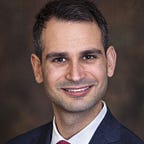America is Bleeding, and Time is Running Out.
I am both an optimist and a realist. As an optimist, I continue to believe that America is a perpetual work in progress, ever striving to become a more perfect union. America’s progress has been undoubtedly uneven, with spurts of progress followed by troughs of regression. The peaks and valleys of American history has nonetheless sustained an upwards trajectory, and America has remained a beacon for hope and freedom throughout the world. At its best, America stands as a city upon a hill.
But as a realist, I understand that past success does not preordain the future. Political division fueled by incentives that encourage polarization has rendered America seemingly unable to make meaningful change. Instead of waging a battle of ideas on an even playing field, the parties are increasingly surrendering to achieving success through changing the ground rules. With every political win secured with one-party support, or by ignoring institutional norms, the legitimacy of the entire democratic system seems to suffer. Given current political dynamics, America’s ability to address pressing challenges is in doubt. For America to endure, this reality cannot continue.
It is painful to be a bystander as America suffers from internal dysfunction. Like many Americans, as the country bleeds from within, I want to come to its aid. But how? If Presidents are unable to mend the nation’s wounds, how can well-intentioned people like me, individuals without pedigree, wealth, or a social media following make a difference. In truth, I am not sure. However, I do believe that if we individually stop trying, we are collectively doomed.
Where would I start? My prescription for America would begin with instituting ranked choice voting in federal elections and with eliminating the Electoral College. These remedies, while not revolutionary, would reinvigorate America’s democratic institutions and counteract the perverse incentives that stoke the flames of internal division.
Ranked choice voting requires a candidate to achieve 50% support in an election plus one vote to win. In many elections, especially where multiple candidates are competing, a person can win with a plurality, but not necessarily a majority of the vote. By requiring a candidate to earn majority support, ranked choice voting moderates’ extremism by forcing candidates to appeal to a wider swath of the voting population. Ranked choice voting also empowers the viability of third-party candidates, which would break the two-party stranglehold by allowing candidates who fail to capture a party’s primary election to still win a general election. With greater political autonomy, politicians could cast votes outside the strict confines of party expectations.
Eliminating the Electoral College would preserve the legitimacy of the Presidency, and consequently the judiciary, by ensuring the President has the backing of at least most of the voting population. Presidential elections are now routinely decided by slim majorities in a handful of swing states. Such states can be subjected to foreign interference, as seen in 2016, and subject to political influence, as seen in 2020. The overall popular vote in Presidential elections is decided by millions of votes, instead of the mere hundreds or thousands as seen in certain states. Larger margins of victory would damper potential concerns over fraud or interference in any single state.
Republicans often maintain that eliminating the Electoral College would benefit Democrats. This assumption though is flawed. For one, Republican Presidents have won the popular vote in the past and would continue to do so in the future with a mainstream message. More importantly, the political argument against eliminating the Electoral College only underscores why the Electoral College should be eliminated. The objective of Presidential elections should be solely to reflect the will of a majority of the voting public. If the Electoral College is no longer achieving this objective, the Constitutional relic should be eliminated.
Despite the merits of ranked choice voting and eliminating the Electoral College, prevailing political incentives and short-sighted politics hamper the possibility of systematic reform. By and large, politicians prefer maintaining a dysfunctional status quo than embracing unfamiliar change. At a minimum, most politicians are more focused on their next election, than implementing larger reforms that require collective action.
As a realist, I have no illusions of the challenges that America faces, and how difficult it is to implement any change, let alone systematic change that would transform federal elections. That said, the status quo is untenable. Something must be done to solve the urgent crisis of legitimacy effecting American democracy and to quell the forces of extremism seeking to impose their autocratic rule.
America is hurting, and I want to help. While I may not have the loudest megaphone, I do have a voice, and I will continue to use that voice to call for reform. Because ever the optimist, I still believe that with the right medicine, America can mend its wounds, and regain its footing. Time though is running out.
